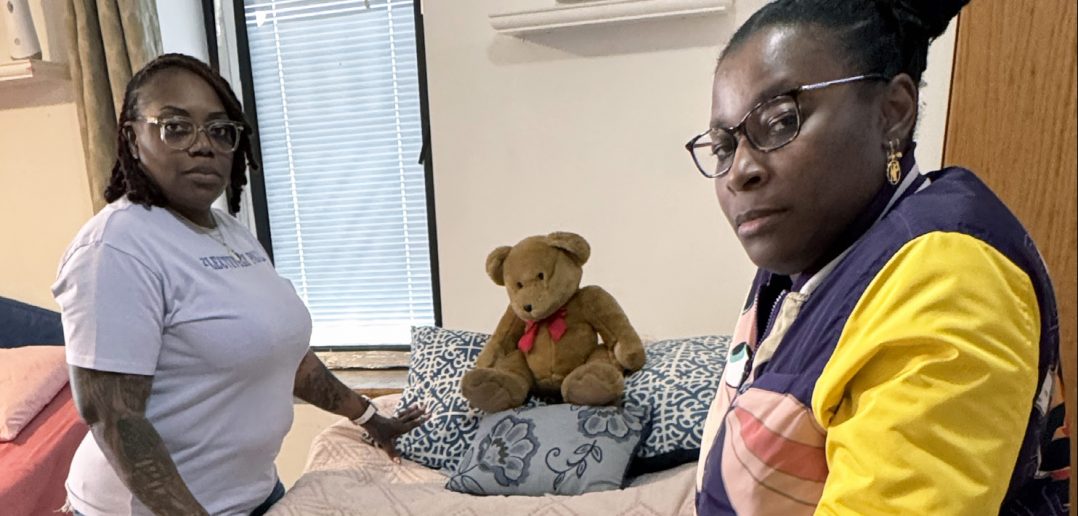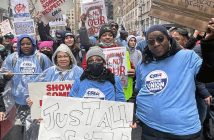BRONX — Nothing great can come from gutting vital federal programs like Medicaid, according to workers who care for individuals at a state Office for People With Developmental Disabilities (OPWDD) group home in the Bronx.
“What’s left when they (individuals) can no longer see their doctors, receive their medication, treatment and care?” asked Nikita Percival, a direct support assistant (DSA) 9 and member of the CSEA Metropolitan DDSO Local. “Their health is going to decline. They’re going to perish.”
Percival fears that despite this bleak prediction, Elon Musk and President Donald Trump are determined to lay off thousands of federal workers and have proposed $2 trillion in cuts from Medicaid, Medicare, housing and food assistance, education, and other vital programs.
In late February, the House of Representatives passed a budget resolution calling for $4.5 trillion in tax cuts for the wealthiest U.S. citizens. The resolution also included a border enforcement and defense programs increase by $300 billion while cutting Medicaid by $880 billion and education cuts of $330 billion over the next decade.
“These patients; these individuals totally depend on Medicaid to be able to get the testing that they need, evaluations, physicals,” said Tamara Gadsden, a supervisor developmental assistant (DA) 1 and also a member of our union’s Metropolitan DDSO Local. “Where would they be if they didn’t have any coverage to pay for these necessities?”
Most OPWDD services are funded through Medicaid. OPWDD, in partnership with more than 400 nonprofit providers across the state, oversees and operates a system of supports serving more than 130,000 people. It is one of the largest in the nation based on the number of people served and budget.
“I feel like we we’re so grounded with our guys (individuals). We know them inside and out and now they’re like our second family,” said Percival. “It’s like we’re worried more about them more than we’re worried about us. Yes, we’re afraid for ourselves, but it’s about them. They’re going to take away all these things from them, then what?”
The primary two diagnoses of the population served are intellectual disabilities (53%) and autism (27%), though they also serve individuals with cerebral palsy, Down syndrome, autism, Prader-Willi syndrome, and other neurological disorders. Some 65% of those served are male and 35% female. 59% of the population served are adults aged 21–64, 34% are children under the age of 21, and 7% are seniors aged 65 and over. 66.2% of the population served are white.
Individuals are family
Brought up in a household in which a sibling had a developmental disorder, Gadsden knows firsthand what’s a stake for these individuals and for her co-workers.
“This job is not just a job for me. This is my life,” said Gadsden. “So, losing them and even thinking about them not receiving the care they deserve deeply saddens me. We’re their family because some of them don’t have family. These individuals see us every day. We are the ones who feed them, bathe them, care for them, dress them, take them out and entertain them. We are their family. You take the care away from them, they will digress.”
Despite these shortsighted and draconian proposed cuts and measures, Percival and Gadsden say they will not go without a fight and will do everything they can to maintain these services for their beloved individuals.
“If we have to go to Washington, if we have to scream, blow horns, whatever it is, we are 10 toes down and we’re ready to do whatever it takes,” said Percival. “We’re not going to lose our guys without a serious fight.”
On the eve of the weekend rally called by labor unions and advocacy groups to protest these cuts and tax breaks for billionaires, Gadsden made a similar pledge.
“We’re not gonna go down without a fight,” said Gadsden. “We’re planning, we’re plotting, we’re doing all the necessary things that need to be done to fight. We’re not gonna just lay down and take this.”
— David Galarza



